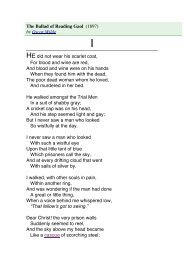Create successful ePaper yourself
Turn your PDF publications into a flip-book with our unique Google optimized e-Paper software.
character of the first voyage of Vespucci.<br />
The greater part of Vespucci's narrative of his first voyage is taken up<br />
with accounts of the manners and customs of the natives; touching which<br />
Las Casas has made some very pertinent remarks. Many of the things<br />
Vespucci states could not have been known to him in the few days that he<br />
remained on the coast, because he did not know a single word of the<br />
language, as he himself confesses. He can only be believed in <strong>those</strong><br />
statements based on what he actually saw or might have seen, and all these<br />
are perfectly applicable to the natives of the coast seen during Hojeda's<br />
voyage. The rest are pronounced by Las Casas to be all fiction; as well as his<br />
enumeration of the animals he saw. Vespucci gives one word in the native<br />
language—Carabi, meaning "a man of great wisdom". Upon this Las Casas<br />
remarks that the Spaniards did not even know the names for bread or for<br />
water, yet Vespucci wants us to believe that, during the few days he<br />
remained at that place, he understood that Carabi signified a man of great<br />
wisdom. He <strong>go</strong>t the word, of course, from the name of the people he heard of<br />
during the voyage of Hojeda—the Carribs, or Canibas—and made it serve<br />
his purpose in this passage. 40<br />
Vespucci does not mention the names of the commanders of the<br />
expedition, nor of any of his Spanish comrades; and he gives only one native<br />
word, Carabi; three names of articles of food, Yuca, Casabi, and Ignami; and<br />
two names of places, Iti and Parias (or Lariab?).<br />
Two of the names for food, Yuca and Casabi, belong to the language of<br />
the Antilles, and Vespucci would have heard of them during his voyage with<br />
Hojeda. Ignami is an African word, which he would have picked up at<br />
Lisbon. The use of the word Yuca, as belonging to the language of the<br />
natives of the Mexican coast near 23° N., is one more proof of the imposture<br />
of his narrative. 41





